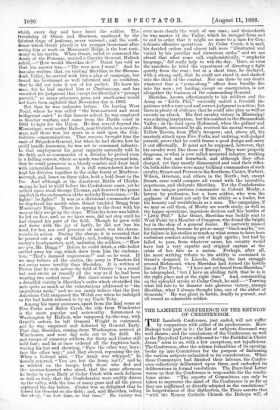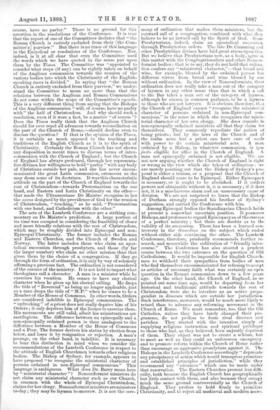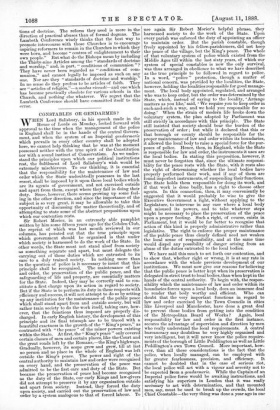THE LAMBETH CONFERENCE ON THE REUNION OF CHRISTENDOM.
THE Lambeth Conference, just ended, will not suffer by comparison with either of its predecessors. More Bishops took part in it ; the list of subjects discussed was well chosen; and the conclusions of the Conference, as well as the Encyclical Letter addressed to "the Faithful in Christ Jesus," seem to us, with a few exceptions, not injudicious. The Conference, after the solemn formalities of its opening, broke up into Committees for the purpose of discussing the various subjects submitted to its consideration. When these Committees had finished their labours, the Confer- ence collectively deliberated upon them, and embodied its deliberations in formal resolutions. The Encyclical Letter warns us that the Conference is responsible for the resolu- tions alone. " The reports of Committees can only be taken to represent the mind of the Conference in so far as they are reaffirmed or directly adopted in the resolutions." In forgetfulness of this distmction, the Times asserts that " with the Roman Catholic Church the Bishops will, of course, have no parley." There is no ground for this assertion in the resolutions of the Conference. It is true that the report of one of the Committees declares that " the Roman Church is entirely excluded from their [the Com- mittee's] purview." But there is no trace of this language in the Encyclical or resolutions of the Conference. Nor, indeed, is it at all clear that even the Committee used the words which we have quoted in the sense put upon them by the Times. The Committee was " appointed to consider what steps (if any) can be rightly taken on behalf of the Anglican communion towards the reunion of the various bodies into which the Christianity of the English- speaking races is divided." In saying that " the Roman Church is entirely excluded from their purview," we under- stand the Committee to mean no more than that the relations between the Anglican and Roman Communions do not come within the scope of the Committee's agenda. This is a very different thing from saying that the Bishops of the Anglican communion " will, of course, have no parley with " the half of Christendom. And why should such a resolution, even if it were a fact, be a matter " of course "? Does the Times really think that the Anglican Church should for ever repel all advances towards reconciliation on the part of the Church of Rome,—should decline even to discuss the question? If that is the opinion of the Times, it is certainly as much opposed to the teaching and traditions of the English Church as it is to the spirit of Christianity. Certainly the Roman Church has not shown any disposition in recent times to discuss terms of inter- communion with the Church of England ; but the Church of England has always professed, through her representa- tive divines, her willingness to hold " parley " with any body of Christians outside her pale, and she has never excom- municated the great Latin communion, erroneous as she may deem some of its doctrines. It was this characteristic attitude on the part of the Church of England towards the rest of Christendom—towards Protestantism on the- one hand, and Eastern and Latin Christianity on the other— that made the Ultramontane De Maistre recognise in her the nexus designed by the providence of God for the reunion of Christendom, " touching," as he said, " Protestantism with one hand, and Catholicism with the other."
The acts of the Lambeth Conference are a striking com- mentary on De Maistre's prediction. A large portion of its time was occupied in considering the feasibility of closer and more friendly relations with the rest of Christendom, which may be roughly divided into Episcopal and non- Episcopal Christianity. The former includes the Roman and Eastern Churches, and the Church of Sweden and Norway. The latter includes those who claim an apos- tolical succession through presbyters, and those (by far the larger number) who claim no other mission than that given them by the choice of a congregation. If they go through the form of ordination, it is only by way of solemnly affirming a previous fact. The ordination is not considered of the essence of the ministry. It is not held to impart what theologians call a character. A man is a minister while he exercises his vocation. He ceases to have any clerical character when he gives up his clerical calling. He drops the title of " Reverend " as being no longer applicable, just as a man drops the title of " M.P." when he ceases to be a Member of the House of Commons. In other words, Orders are considered indelible in Episcopal communions. The " unfrocking " of a priest does not resily deprive him of his Orders ; it only deprives him of the licence to exercise them. His sacraments are still valid, albeit his ministrations are sacrilegious. The difference between an episcopally and a non-episcopally ordained person is thus analagous to the difference between a Member of the House of Commons and a Peer. The former derives his status by election from below, and loses it by resignation or rejection. A man's peerage, on the other hand, is indelible. It is necessary to bear this distinction in mind when we consider the recommendations of the Lambeth Conference in respect to the attitude of English Churchmen towards other religious bodies. The Bishop of Sydney, for example, appears to have proposed "to recognise the ministerial character of persons ordained in non-Episcopal communions." This language is ambiguous. What does Dr. Barry mean here by " ministerial character " ? Nonconformist ministers do not claim any ministerial character such as our Church, in common with the whole of Episcopal Christendom, claims for her clergy. Nonconformist ministers are ministers to-day ; they may be laymen to-morrow. It is not the cere- mony of ordination that makes them ministers, but the outward call of a congregation, combined with what they believe to be an inward. call by the Spirit of God. Some Presbyterians, indeed, claim an apostolical succession through Presbyterian orders. The late Dr. Cumming and other Presbyterian divines have laid great stress upon this. But we believe that Presbyterians now, as a body, agree in this matter with the Congregationalists and other Noncon- formist bodies ; that is to say, they do not hold that ordina- tion confers any " ministerial character,"—that bread and wine, for example, blessed by the ordained person has different virtue from bread and wine blessed by one without ordination. In the view of Nonconformists, their ordination does not really take a man out of the category of laymen iu any other sense than that in which a call to the Bar takes a man out of the category. of laymen, although he ceases, in common parlance, to be a layman to those who are not lawyers. It is obvious, therefore, that the Church of England cannot " recognise the ministerial character of persons ordained in non-Episcopal com- munions," in the sense in which she recognises the minis- terial character of her own clergy. She does concede to non-episcopally ordained. ministers all that they claim for themselves. They commonly repudiate the notion of being priests ; but by the laws of the Church and of the realm none but a priest can have cure of souls with power to do certain ministerial acts. A man ordained by a Bishop, in whatever communion, is ipso facto eligible for office in the Church of England. A man not episcopally ordained. is not eligible. We are• not now arguing whether the Church of England. is right or wrong in the view which she takes of ordination : we are merely pointing out that the Bishop of Sydney's pro- posal is either a truism, or a proposal that the Church of England should cease to be Episcopal. Either Episcopacy is necessary, or it ought to be abolished. If it confers powers not obtainable without it, it is necessary ; if it does not, it is a mischievous sham and an unnecessary cause of division. We are not surprised to learn that the Bishop of Durham strongly opposed his brother of Sydney's suggestion, and carried the Conference with him. Among Episcopal bodies the Scandinavian Church' holds at present a somewhat uncertain position. It possesses Bishops, and professes to regard. Episcopacy as of the essence of a perfect ministry ; but there are doubts as to the validity of its succession. There has been a learned con- troversy in the Guardian on the subject which ended without either side convincing the other. The Lambeth Conference, therefore, prudently recommends further re- search, and meanwhile the cultivation of " friendly inter- course." The Conference has also steered a prudent course between the two extremes on the question of Old. Catholicism. It would be impossible for English Church- men to withhold. their sympathies from bodies of men who find themselves excommunicated for refusing to accept as articles of necessary faith what was certainly an open question in the Roman communion down to a few years ago. On the other hand, the Church of England, as we pointed out some time ago, would be departing from her historical and traditional attitude towards the rest of Christendom were she to interfere as an active propa- gandist in dioceses which are outside her jurisdiction. Such interference, moreover, would be much more likely to retard. than to advance any reforming movement in the Church of Rome. We must remember, too, that the Old Catholics, unless they have lately changed their pro- gramme, do not profess to form rival dioceses and parishes. They started with the intention simply of supplying religious instruction and spiritual privileges to those who had, as they believed, been unjustly deprived of them. Their object was not to create a schism, but to meet as well as they could an unforeseen emergency, and to promote reform within the Church of Rome rather than encourage an aggressive proselytism against it. The Bishops in the Lambeth Conference accordingly " deprecate any precipitancy of action which would transgress primitive and established principles of jurisdiction," while they recommend. any " advances " which can be made under that reservation. The Eastern Churches present less diffi- culty, both because the English Church has geographically but little contact with them, and also because they occupy much the same ground controversially as the Church of England. They • profess to hold. firmly to primitive Christianity, and to reject all mediaeval and modern aecre- tions of doctrine. The reform they need is more in the direction of practical abuses than of formal dogmas. The Lambeth Conference wisely thinks that the best way to promote intercourse with those Churches is to encourage aspiring reformers to remain in the Churches in which they were born, and become " centres of enlightenment to their own people." But what do the Bishops mean by including the Thirty-nine Articles among the " standards of doctrine and worship," and, in part, " conditions of communion " ? They have never been regarded as " conditions of com- munion," and cannot legally be imposed as such on any one. Nor are they " standards of doctrine and worship." In no sense do they profess to be articles of faith. They are " articles of religion,"—a modus vivendi—and one which has become practically obsolete for various schools in the Church, and nothing else whatever. We regret that the Lambeth Conference should have committed itself to this error.




































 Previous page
Previous page